Germany France push for secondary sanctions on Russia amid Ukraine war – Al Jazeera English
Published on: 2025-08-29
Intelligence Report: Germany France push for secondary sanctions on Russia amid Ukraine war – Al Jazeera English
1. BLUF (Bottom Line Up Front)
Germany and France are advocating for secondary sanctions targeting entities supporting Russia’s war efforts in Ukraine. The most supported hypothesis is that this initiative aims to increase economic pressure on Russia by targeting third-party countries and companies. Confidence level: Moderate. Recommended action: Support diplomatic efforts to align EU member states on the sanctions strategy and prepare for potential economic repercussions.
2. Competing Hypotheses
1. **Hypothesis A**: Germany and France’s push for secondary sanctions is primarily aimed at economically isolating Russia by targeting third-party countries and companies that support Russia’s war efforts.
2. **Hypothesis B**: The push for secondary sanctions is a strategic move to pressure Russia into diplomatic negotiations, leveraging economic isolation as a tool to bring Russia to the negotiation table.
Using the Analysis of Competing Hypotheses (ACH) 2.0, Hypothesis A is better supported due to the direct mention of targeting companies and countries supporting Russia’s war efforts, indicating a focus on economic measures rather than diplomatic engagement.
3. Key Assumptions and Red Flags
– **Assumptions**: It is assumed that secondary sanctions will effectively deter third-party support for Russia. Another assumption is that EU member states will uniformly support these sanctions.
– **Red Flags**: Potential resistance from EU countries with strong economic ties to Russia or those fearing economic backlash. Lack of clarity on enforcement mechanisms for secondary sanctions.
– **Blind Spots**: The potential for Russia to circumvent sanctions through alternative alliances or economic partnerships is not addressed.
4. Implications and Strategic Risks
– **Economic Risks**: Potential backlash from countries affected by secondary sanctions, leading to strained diplomatic relations within the EU and with non-EU countries.
– **Geopolitical Risks**: Escalation of tensions between Russia and the EU, possibly leading to retaliatory measures from Russia.
– **Cybersecurity Risks**: Increased likelihood of cyberattacks from Russian entities as a form of retaliation.
– **Psychological Impact**: Heightened anxiety among EU populations about the economic impact and potential escalation of the conflict.
5. Recommendations and Outlook
- Engage in diplomatic efforts to ensure EU member states’ alignment and address concerns about economic impacts.
- Develop contingency plans for potential Russian retaliatory actions, including cyber threats.
- Scenario Projections:
- Best Case: Sanctions effectively isolate Russia economically, leading to a reduction in its war efforts.
- Worst Case: Sanctions lead to significant economic backlash within the EU and escalate tensions with Russia.
- Most Likely: Sanctions create moderate economic pressure on Russia but face challenges in enforcement and compliance.
6. Key Individuals and Entities
– Friedrich Merz
– Emmanuel Macron
– Vladimir Putin
– Volodymyr Zelenskyy
– Donald Trump
7. Thematic Tags
national security threats, economic sanctions, geopolitical strategy, EU-Russia relations





